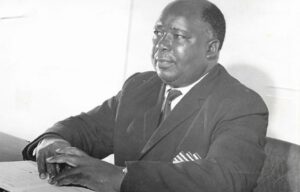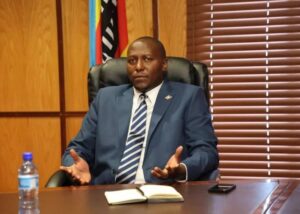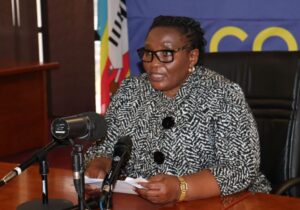Note: Eswatini is governored by King Mswati III, who holds extensive powers, including the appointment of the Prime Minister
The position of Prime Minister of Eswatini (formerly known as Swaziland) was established in 1967. Since then, the country has seen a series of leaders who have played significant roles in shaping its political landscape. Below is a detailed table listing the Prime Ministers of Eswatini, arranged along with their years of tenure.
READ ALSO: Presidents That Have Ruled Mauritius Till Date
| No. | Prime Minister | Tenure | Monarch(s) |
|---|---|---|---|
| 1 | Makhosini Dlamini (1914–1978) | 16 May 1967 – 31 March 1976 | Sobhuza II (1899–1982) |
| 2 | Maphevu Dlamini (1922–1979) | 31 March 1976 – 25 October 1979 (died in office) | Sobhuza II |
| 3 | Ben Nsibandze (1931–2021) | 25 October 1979 – 23 November 1979 | Sobhuza II |
| 4 | Mabandla Dlamini (b. 1930) | 23 November 1979 – 25 March 1983 | Sobhuza II |
| 5 | Bhekimpi Dlamini (1924–1999) | 25 March 1983 – 6 October 1986 | Mswati III (1986–present) |
| 6 | Sotsha Dlamini (1940–2017) | 6 October 1986 – 12 July 1989 | Mswati III |
| 7 | Obed Dlamini (1937–2017) | 12 July 1989 – 25 October 1993 | Mswati III |
| 8 | Andreas Fakudze (d. 2013) | 25 October 1993 – 4 November 1993 | Mswati III |
| 9 | Jameson Mbilini Dlamini (1921–2008) | 4 November 1993 – 8 May 1996 | Mswati III |
| 10 | Sishayi Nxumalo (1936–2000) | 8 May 1996 – 26 July 1996 | Mswati III |
| 11 | Barnabas Sibusiso Dlamini (1942–2018) | 26 July 1996 – 29 September 2003 | Mswati III |
| 12 | Paul Shabangu (c. 1943–) | 29 September 2003 – 26 November 2003 | Mswati III |
| 13 | Themba Dlamini (b. 1950) | 26 November 2003 – 18 September 2008 | Mswati III |
| 14 | Bheki Dlamini | 18 September 2008 – 23 October 2008 | Mswati III |
| 15 | Barnabas Sibusiso Dlamini (1942–2018) | 23 October 2008 – 5 September 2018 | Mswati III |
| 16 | Vincent Mhlanga | 5 September 2018 – 29 October 2018 | Mswati III |
| 17 | Ambrose Mandvulo Dlamini (1968–2020) | 29 October 2018 – 13 December 2020 | Mswati III |
| 18 | Themba N. Masuku (b. 1950) | 13 December 2020 – 16 July 2021 | Mswati III |
| 19 | Cleopas Dlamini (b. 1952) | 16 July 2021 – 28 September 2023 | Mswati III |
| 20 | Mgwagwa Gamedze | 28 September 2023 – 4 November 2023 | Mswati III |
| 21 | Russell Dlamini | 4 November 2023 – Present | Mswati III |
First Prime Minister: Makhosini Dlamini

Makhosini Dlamini served as the inaugural Prime Minister of Eswatini from 1967 until 1976. He was born in 1914 and passed away in 1978.
Dlamini was a member of the Imbokodvo National Movement, which was the ruling party until the political landscape shifted in the early 1970s.
Before becoming Prime Minister, Dlamini held several significant positions in the Swazi government. He was involved in various capacities during the transitional period leading up to Eswatini’s independence.
Notable Achievements and Downsides
Dlamini’s tenure was marked by efforts to modernize the country’s infrastructure and governance. However, his administration faced criticism for its lack of political pluralism and suppression of dissent, which led to a more authoritarian governance style.
READ ALSO: Presidents That Have Ruled The Central African Republic Till Date
Current Prime Minister: Russell Dlamini

Russell Dlamini has been serving as the Prime Minister of Eswatini since November 4, 2023. He is a member of the Independent political affiliation, appointed directly by King Mswati III.
Before he was appointed Prime Minister, Russell Dlamini held various roles within the government, including positions in economic planning and development.
Notable Achievements and Downsides
As a new leader, Russell Dlamini’s administration is still in its early stages, but he is expected to focus on economic recovery and addressing public grievances related to governance and service delivery. The challenges he faces include managing an economy affected by external factors and internal pressures for reform.
READ ALSO: Presidents That Have Ruled Eritrea Till Date
Current Deputy Prime Minister: Thuli Dladla

Thulisile Dladla, born around 1959 in Eswatini, began her educational journey at St Michael’s High School, graduating in 1975.
She then pursued a Bachelor’s degree in Humanities at the University of Botswana, graduating in 1981. Later, she obtained a Master’s degree in Educational Administration from Saint Mary’s University in Canada in 1994.
Notable Achievements
Dladla’s appointment as the first woman to serve as the Minister of Foreign Affairs and International Cooperation in Eswatini was a significant milestone in her career and for women’s representation in the country’s leadership.
Her visit to Taiwan in February 2019 and her meeting with President Tsai Ing-wen further highlighted her diplomatic skills and the importance of international relations for Eswatini.
Conclusion
The political history of Eswatini is characterized by a series of leaders who have navigated the complexities of governance in a monarchy.
The Prime Ministers have played pivotal roles in shaping the nation’s policies and addressing its challenges. As the country moves forward, the current leadership under Russell Dlamini and Cleopas Dlamini will be crucial in determining the future direction of Eswatini.
